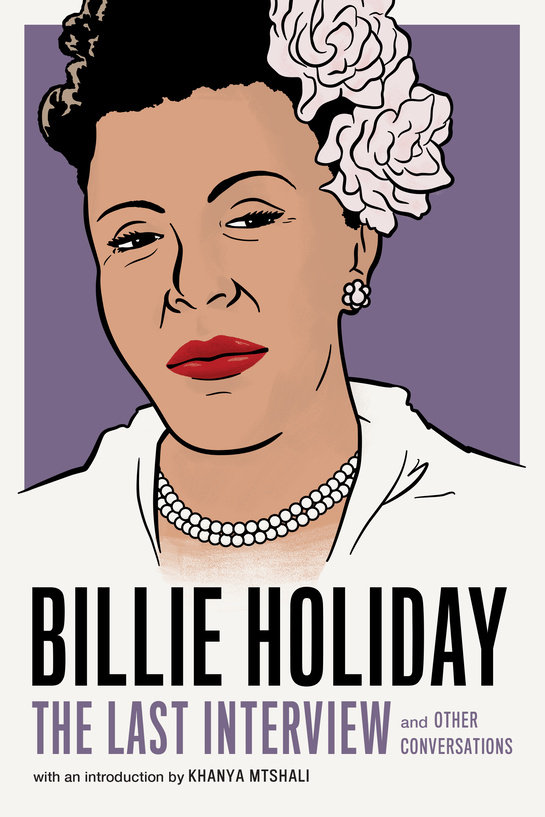Address change to reviews.pivic.com
This site is changing its address.

Billie Holiday was an icon. For most, probably well-known for her fantastic, soaring voice and disasterous end of her life. She not only commanded a supreme sotto voce but had the mind to know her way around jazz and its musicians. Drug abuse and legal issues were massive hurdles in her life.
Deep dives into Holiday’s life, as described by John Szwed and Holiday herself, are not contained in this small collection of interviews. The book instead publishes interviews ranging from her heyday in 1939 to the last interview, which was finished two days after Holiday died, in 1959.
From the first interview, published 1 November 1939:
You sit with Billie Holiday and watch her smoke cigarettes chain fashion. The first thing that strikes you is her frankness. “I’ll never sing with a dance band again,” she tells you. “Because it never works out right for me. They wonder why I left Count Basie, and why I left Artie Shaw. Well I’ll tell you why—and I’ve never told this before. “Basie had too many managers—too many guys behind the scenes who told everybody what to do. The Count and I got along fine. And the boys in the band were wonderful all the time. But it was this and that, all the time, and I got fed up with it. Basie didn’t fire me; I gave him my notice.”
You ask Billie why she didn’t make more records with Shaw. You remember that the only side she made, on Bluebird, was a thing titled “Any Old Time” and was really wonderful. “That’s a laugh,” she answers. “Artie never paid me for that record. Just before it came out I simply got enough of Artie’s snooty, know-it-all mannerisms, and the outrageous behavior of his managers, and left the band. I guess Artie forgot about ‘Any Old Time.’ I know he never paid me. With Basie I got $70 a week—with Artie I got $65. When I make my own records I get $150. That’s another reason I left Shaw.
I mean, talk about honesty. Very, very few musicians were this frank and honest back in the day; perhaps even fewer today. And Holiday was a woman; this kind of talk was unheard of.
And this from a person who carried vast knowledge of her profession and, to boot, was one of the most singular jazz voices, ever.
You ask her one more thing, recalling how at various times Billie has been reported ready to marry. She shows her frankness again. “I’ve loved three men,” she tells you. “One was a Marion Scott, when I was a kid. He works for the post office now. The other was Freddie Green, Basie’s guitar man. But Freddie’s first wife is dead and he has two children and somehow it didn’t work out. The third was Sonny White, the pianist, but like me, he lives with his mother and our plans for marriage didn’t jell. That’s all.”
From her very last interview:
To get help I had to go to Europe where a drug addict isn’t treated like a scar on the face of society, but like a human being trying to get off the wrong road. All my own country ever did for me was dump me into an over-crowded jail. If I lived, they’d feed me—and if I died, they’d bury me. They’re watching me now—watching me the way a hawk watches a crippled sparrow. They’ve taken away my magazines and phonograph, my records and my radio. The only thing they let my friends bring me is a jar of yoghurt or a pint of ice cream. Right here I’m under arrest again—again on a narcotics charge. What they’ll eventually do with me, I don’t know. I hold no regrets and I carry no shame. Nobody can laugh or cry for you—you have to laugh or cry all alone. If my life was wrong or right—good or bad—it’s still my life and what’s about to happen—will happen just to me. We’re all the same, but we’re different. What sings in you, sings different in me. It’s all part of that great crazy game called living. But when I leave this lump they call the world, I’m going to leave all my blues behind and walk off singing.
In all, Holiday was a colourful bird who not only once sang, but whose singing will continue to lift the spirits of all who hear her far and often, for as long as humanity lives.
This book is a simple tome. It should be seen as a complement to both Szwed’s work and the autobiography. The book warrants a purchase by people who want insight into the world of a honest, insanely haunted, and extremely talented person.
